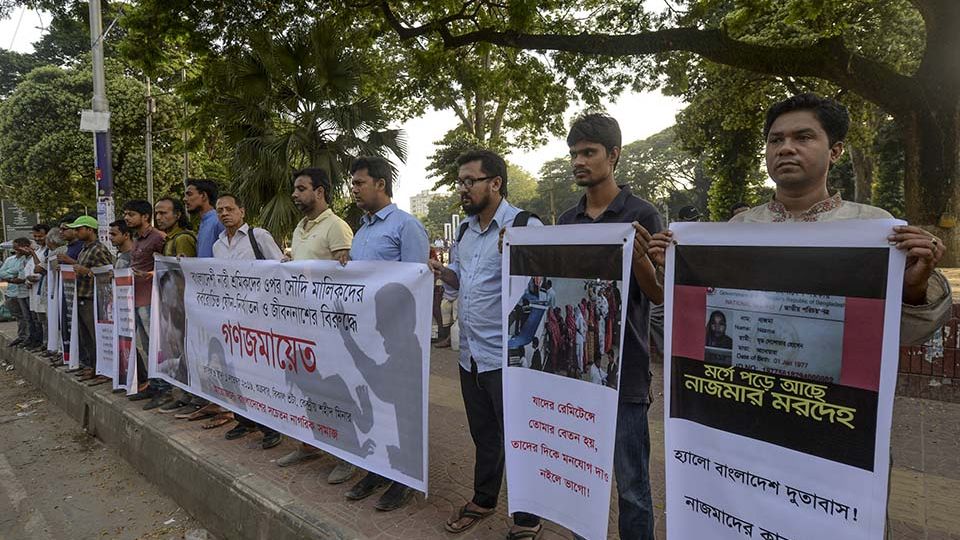May 15, 2025
DHAKA – A Human Rights Watch investigation found that migrant workers from Bangladesh, India and Nepal have died in gruesome yet avoidable workplace-related accidents in Saudi Arabia.
Many migrant deaths in the Gulf country are erroneously classified as “natural” and are neither investigated nor compensated, said the report.
It found that employers violated or sought to evade their obligation under Saudi law that requires employers to bear the costs of repatriation of the remains.
HRW found that the “No Objection Certificate” given to a Bangladeshi worker who died of “electrocution” marked the possibility of compensation as “no”, with the cause of death as “not available”.
The son of the Bangladeshi man who died of electric shock told HRW that his father’s employer said that they will receive compensation if they agree on a burial on Saudi soil.
“The family rejected this and had to pay more than Tk 5 lakh to repatriate the body, which they financed through loans. The family received Tk 3.35 lakh in compensation from the Bangladeshi government,” the report said.
The family is now in debt, it said.
The family members of nine deceased Bangladeshi workers told HRW that the employers offered lump sum payments or coverage of monthly expenses provided that the dead are buried in Saudi Arabia.
“Despite their dire economic conditions, eight families said they had refused these offers while six paid the repatriation costs themselves,” said the report.
The report said that the failure to acknowledge workplace deaths and ensure timely social security for surviving family members can lead to poverty.
A widow of a Bangladeshi migrant worker told HRW, “To make ends meet, I have put my 14-year-old son to work, and the little money he earns is used for our daily expenses.”
The widow of a 46-year-old Bangladeshi construction worker in Saudi Arabia recounted that her husband died in a workplace accident when a machine was accidentally turned on while he was trying to fix it. His head was severed in the incident.
“When we received his body, I wanted to hold him one last time, but it wasn’t possible. Seeing him in that state, I lost consciousness,” said the woman to HRW.
The widow of another 43-year-old Bangladeshi concrete block cutter in Saudi Arabia said her husband, who lacked experience with the heavy machine he was operating, was killed by a blade of the machine.
The widow of a 36-year-old Bangladeshi construction worker in Saudi Arabia said her husband died after a large stack of heavy blocks collapsed on him at a worksite. A relative who witnessed the incident reported that the blocks were too heavy to move by hand, and by the time a crane was brought in, her husband had already died. His body was crushed under the weight of the blocks.
The widow of a 33-year-old Bangladeshi migrant worker who had been in Saudi Arabia for only seven months said her husband fell from the third floor of a building under demolition while breaking a wall. Although he survived the fall initially, no one helped him due to fear of legal consequences, and he later died.
HRW interviewed the family of another 48-year-old Bangladeshi construction worker in Saudi Arabia who said he died after falling from the fifth floor of a building. His safety belt came off while doing shuttering work, causing him to fall onto debris and iron pieces at an elevator landing area.
The families received little support when trying to bring back the bodies.
“The Saudi Kafil [sponsor] wanted to bury my husband in Saudi Arabia, but I did not give consent. I wanted to bring him back to see him one last time. The Kafil did not provide any financial assistance,” said the widow of the 46-year-old.
Saudi Arabia’s General Organization for Social Insurance provides mandatory coverage for work-related injuries and deaths. Funded by a 2 percent salary contribution, the scheme offers compensation to surviving family members, amounting to 84 months of the deceased’s salary.
However, the families HRW spoke to said that accessing this was a long, uphill battle and often tied to local burials.
The family of a 44-year-old Bangladeshi said, “Neither the Saudi government nor the company provided any financial assistance. The company had previously promised to help me, but I never received any support.”
The widow of a 26-year-old Bangladeshi construction worker in Saudi Arabia, who was crushed to death by a loader, reported that it took over three months to return his body to Bangladesh due to bureaucratic delays and the employer’s refusal to take responsibility. Despite repeated requests, the company did not pay overdue wages, end-of-service benefits, or additional compensation.
The widow of a 32-year-old Bangladeshi laborer who died due to electric shock told HRW, “At the time of his death, there was one month’s unpaid salary left which the company later sent to us. But we did not get back any of the money that he had in the bank nor his other belongings.”
Michael Page, deputy Middle East director at HRW, said, “The gruesome workplace accidents killing migrant workers in Saudi Arabia should be a huge red flag for businesses, football fans, and sports associations seeking to partner with FIFA on the 2034 Men’s World Cup and other Saudi ‘giga-projects’.
“Given that Saudi authorities are failing to adequately ensure basic safety protections and social security for migrant workers, local and international companies face a larger responsibility to ensure that serious rights violations are not occurring throughout their business operations in Saudi Arabia.”


